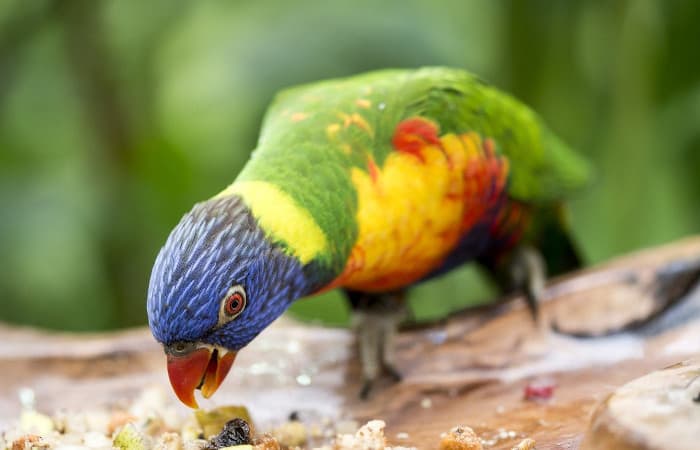There is a lot of debate over whether or not fruit seeds and pits can be toxic to parrots and even kill them.
Some people say that some fruit seeds and pits kill parrots, while others believe that fruit seeds and pits are not a problem.
The truth is, it depends on the type of fruit.
In this blog post, we will discuss which fruits contain seeds or pits that are safe for parrots to eat, and which ones contain seeds or pits that could potentially be harmful.
What is the difference between fruit pit and seed?
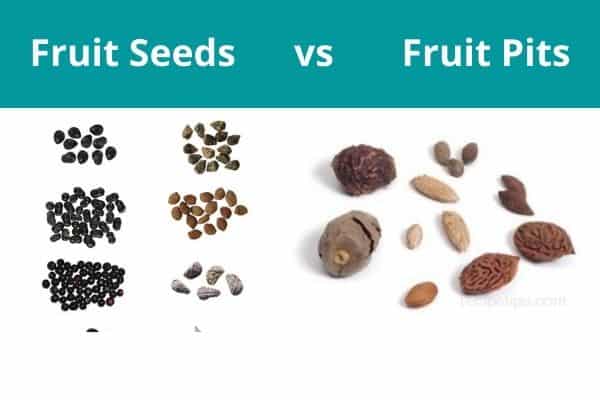
At first glance, a fruit pit and a seed may seem very similar.
Both are hard, round structures found inside fruits and contain the potential for new life.
However, there are actually distinct differences between these two plant parts.
For one thing, fruit pits tend to be much larger than seeds.
This is because they are typically housed within thicker walls that protect the seed from being crushed.
Additionally, fruit pits contain all of the genetic material needed for a new plant to grow from scratch, while a seed requires further nourishment in order to sprout.
Ultimately, then, the difference between fruit pit and seed lies in their size and ability to grow into new plants.
Though both play important roles in propagating life within the natural world, each has its own unique characteristics that set it apart from other plant organs.
What do parrots usually eat?
Parrots are omnivorous birds, which means that they typically eat both plants and animals.
The exact diet of a parrot depends on the specific species, but most parrots eat a diet that includes fruits, vegetables, nuts, seeds, and insects.
Some of the most popular fruits and vegetables that parrots enjoy include apples, carrots, spinach, and berries.
In the wild, parrots also consume a variety of nuts, such as almonds and walnuts.
Additionally, many parrots also enjoy eating insects, such as grubs and caterpillars.
Pet parrots, just like in the wild, thrive on a diet of fresh fruits, vegetables, seeds, and nuts, often supplemented with pellets that are specially made for them based on value.
Are fruit seeds and pits toxic to parrots?
While most parrots will enjoy the occasional piece of fruit, it is important to be aware that some fruit seeds and pits can be toxic or even fatal to these birds.
In particular, apricot, cherry, peach, and plum pits contain cyanogenic glycosides, which can release cyanide gas when chewed or digested.
As a result, it is best to remove the seeds and pits from any fruit before offering it to your parrot.
Additionally, avocado pits and skins contain a compound called persin, which can cause gastrointestinal upset in birds.
While there are many healthy and safe foods that parrots can enjoy, it is important to be cautious about giving them fruits with seeds or pits.
If you’re not sure whether a particular fruit is safe for parrots, check with your veterinarian before feeding it to your bird.
What fruit seeds and pits can parrot not eat?
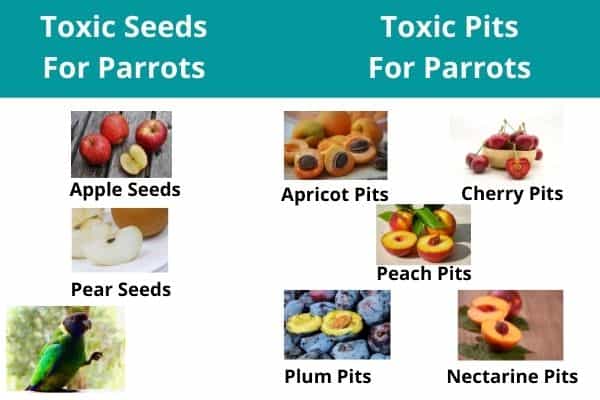
Unsafe fruit seeds
Apples
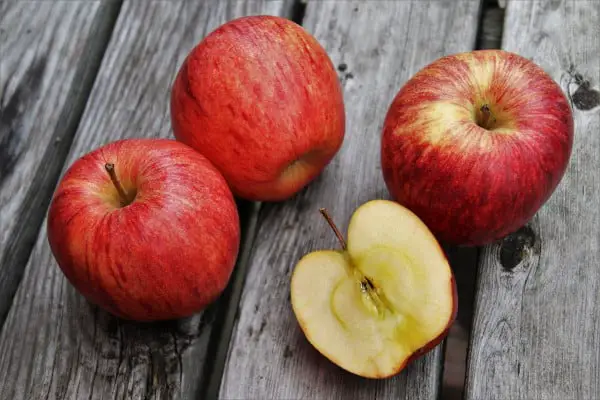
Apples are fruits that come from the apple tree.
Apple trees are small, deciduous trees that grow in temperate climates.
The apple fruit is a many-seeded pome and has a hard skin that may be red, green, or yellow when ripe.
The flesh of the apple fruit can be white, yellow, or pink.
However, apple seeds are toxic to parrots because they contain cyanide which leads to serious health problems or even death of parrots.
Pears
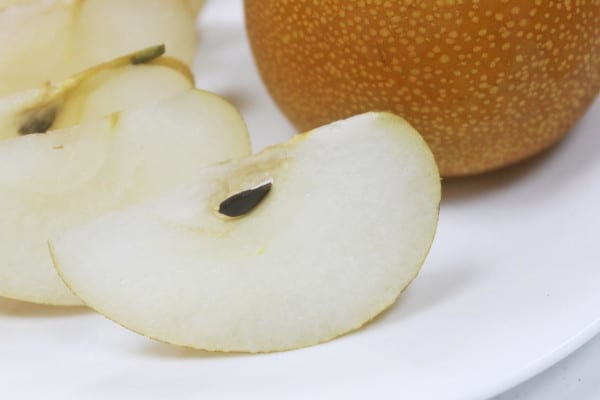
Pears are fruits that come from the pear tree.
Pear trees are deciduous trees that grow in temperate climates.
The pear fruit is a many-seeded pome and has a thin skin that may be green, yellow, or red when ripe.
The flesh of the pear fruit can be white, yellow, or green.
Pear seeds are poisonous to parrots, however, because they contain cyanide, which can cause significant health issues or even death if ingested.
Unsafe fruit pits
Cherries
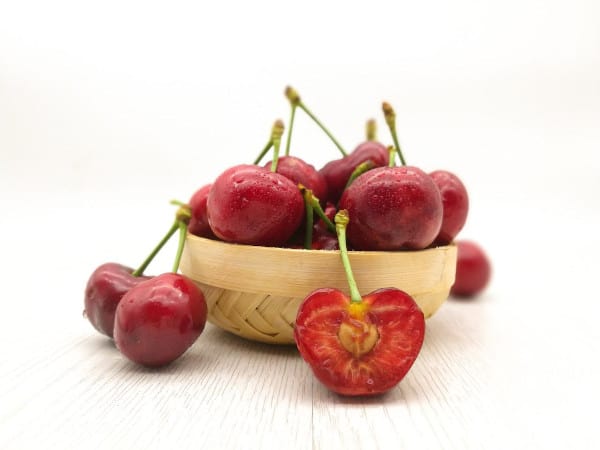
Cherries are a type of fruit that grows on trees. They are usually red or dark purple in color and have a sweet flavor.
Cherries are a good source of vitamins and minerals, including vitamin C, potassium, and magnesium.
Parrots can safely enjoy cherries except for the pits. Cherry pits are toxic to parrots because of the poisonous substance cyanide.
Peaches
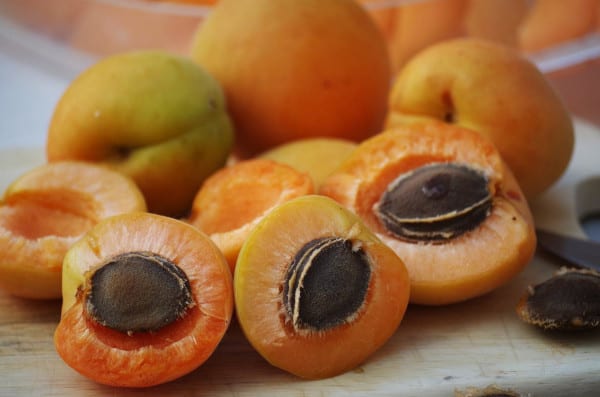
Peaches are sweet fruit that is typically orange or yellow in color. They grow on trees and have a fuzzy exterior.
Peaches are a good source of Vitamin A and C, as well as dietary fiber.
However, peach pits are poisonous to parrots and should be removed before feeding your birds.
Plums
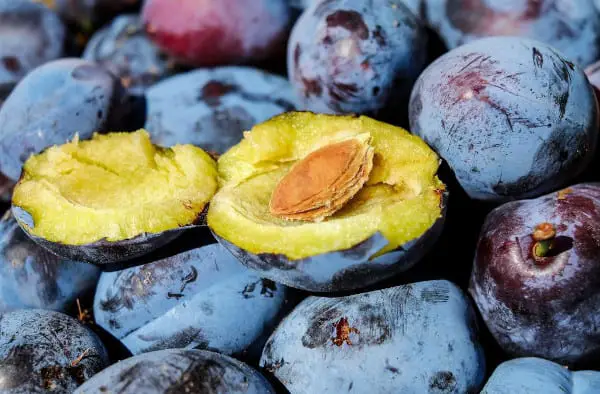
Plums are a type of fruit that belongs to the same family as peaches and nectarines.
These fruits are typically round or oval in shape, and they can vary in color from yellow to red to purple.
Plums are a good source of fiber and vitamins C and K.
Plum pits are poisonous and should be avoided for your parrots.
Apricots
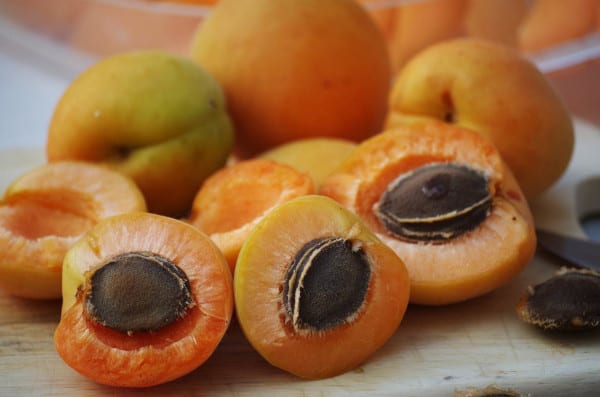
Apricots are a type of stone fruit that is closely related to peaches and plums.
They have a smooth, velvety skin that ranges in color from deep yellow to orange-red, and a flesh that is firm yet juicy.
Apricots are typically smaller than either peaches or plums, with a diameter of only 2-3 inches.
Apricot pits are not edible to parrots and are actually toxic to these beautiful birds.
Nectarines
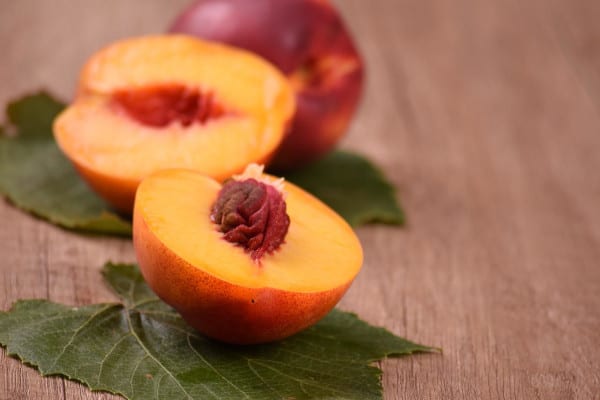
Nectarines are a type of peach. They are similar to peaches but have smooth skin and lack the fuzz found on most peaches.
The flesh of a nectarine is also less yellow than that of a peach, and the flavor is considered to be more intense.
Again, nectarine pits are toxic to parrots and should be removed before serving your parrot.
What are the symptoms of cyanide poisoning?
Cyanide poisoning can occur one to two hours after seeds and pits have been digested.
It can cause a number of signs and symptoms, including headache, dizziness, weakness, nausea, vomiting, chest pain, shortness of breath, and confusion.
In severe cases, it can lead to coma or death.
What should you do if your parrot ate the toxic fruit seeds or pits?
If your parrot has eaten the toxic fruit seeds or pits, your first step should be to take it to a vet immediately.
These types of seeds and pits can be very dangerous for birds, as they contain substances that can cause severe damage to their digestive systems.
The vet will likely perform a range of tests and examinations to determine the extent of the damage, as well as provide any necessary treatment or medication.
In any case, you should always remain vigilant when it comes to caring for your parrot so that you can prevent accidents like this from happening again in the future.
What fruit seeds and pits are safe and healthy for parrots?
There are many types of fruit seeds and pits that are considered safe and healthy for parrots.
These fruits are rich in vitamins and nutrients, making them great sources of nutrition for parrot species.
In addition, most fruit seeds and pits contain natural anti-inflammatory compounds, which can help to keep parrots healthy by reducing swelling and pain in their joints.
Some of the most popular safe fruit seeds are:-
- Cantaloupe
- Cranberries
- Grapefruits
- Grapes
- Lemons
- Oranges
- Pomegranates
- Pumpkins
- Squashes
- Watermelon
Overall, when it comes to picking out a healthy fruit for your parrot, it’s important to consider both the nutritional value and potential risks of the fruits.
Conclusion
In conclusion, it is important to be aware that not all fruit seeds and pits are safe for parrots.
Apple and pear seeds, cherry, apricot, peach, plum, and nectarine pits, in particular, contain a toxic substance called cyanide which can be very dangerous for these birds.
If your parrot has eaten any of these fruits, it is important to take them to a vet immediately.
While there are many types of fruit seeds and pits that are safe for parrots, it is important to do your research beforehand to make sure that you are picking the best possible option for your bird’s health.
I hope this article was helpful in answering your question.
